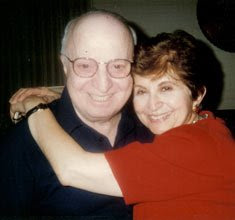Thursday, March 13, 2008
Untold Stories: Nina Saah

Untold stories: Nina Saah
IMEU, Mar 12, 2008
Nina Saah and her husband Issa.
Nina Saah and her husband were next door neighbors as children growing up in Jerusalem in the 1930's and 40's. When Nina was a student at the Schmidt's Girls College, a Catholic School run by nuns, Issa tutored her in math and poetry. After she graduated, he asked for her hand in marriage. But soon after proposing, he decided they should wait. He didn't want to make Nina a bride and a widow in the same week. It was 1948 and Zionist militias were attacking Palestinian neighborhoods in Jerusalem in anticipation of the end of the British Mandate in Palestine.
Little did the couple know they would end up waiting 15 years to finally marry. "We lived in the Musrara Quarter of Jerusalem, near the Italian hospital and a Protestant church. The Stern Gang, a Zionist militia, used to come into the area and set booby traps. One explosion killed a British soldier. I saw part of his lower leg dangling from the roof of the church. I was only a teenager. It was too much."
In May of 1948, Nina's family fled from their home in terror. Zionist militants had placed a one-ton bomb in a car, warning residents to leave because they were going to detonate it. "We threw as many of our belongings as we could into a truck and we left. We took only the most important things. My mother used to paint, so we took her paintings and the traditional Palestinian embroidery she had stitched by hand. We took our things to the Italian Salesian school for protection and went to stay with my uncle who lived in the Old City of Jerusalem. The Zionists bombarded the Salesian school. All of our things were destroyed."
As the violence in Jerusalem intensified, her family fled a second time - to Jordan. "We thought it would be a matter of weeks, only until the fighting died down. My father told us not to worry about the things we lost. All that mattered to him was that we were safe. We could replace our lost belongings when we returned to Palestine he said. Of course, we were never allowed to go home. My father spent the rest of his days in Jordan."
Nina worked in Jordan with the United Nations Relief and Works Agency (UNRWA) which was created to give emergency aid to Palestinians displaced in the 1948 war. She left UNRWA in 1953 and spent the next 10 years working for the United States Agency for International Development (USAID). In 1963, she was reunited with Issa by chance. Having immigrated to America, he never forgot Nina. He traveled to Jordan that year with a friend and immediately began searching for her. He found her one afternoon and proposed the same night. They traveled to Washington, DC, where they married and raised their three children. Nina went on to work for the Embassy of Kuwait but never forgot her homeland. Saah wants Americans to know about the Nakba because she believes it will help them understand what motivates Palestinians today. She says she doesn’t want Americans to be pro-Palestinian; just to be even-handed. "The American people are gracious and caring, but that caring is not distributed fairly. We Palestinians don't get any of it, while Israel is backed fully with American tax money. Today, we are presented as terrorists. No one knows about the terrorism I saw as a child growing up, the terrorism that robbed me of my home. I want people to know that we are people like them. We care for our children, their education and their future."But too often she says, "when people try to tell our story they are intimidated into silence. Former President Carter spoke about the apartheid Palestinians are living under today and he was criticized and called anti-Jewish. The Jews suffered at the hands of Europeans. And we Palestinians today are suffering at the hands of Israel. We want our suffering to end. We want to go home."
The "Nakba" ("catastrophe" in Arabic) refers to the destruction of Palestinian society in 1948 and the exile of more than 700,000 Palestinians from their homes and homeland. It is estimated that more than 50 percent were driven out under direct military assault by Israeli troops. Others fled in panic as news spread of massacres in Palestinian villages like Deir Yassin and Tantura. Nearly half the Palestinian refugees had fled by May 14, 1948, when Israel declared its independence and the Arab states entered the fray. Israel depopulated more than 450 Palestinian towns and villages, destroying most while resettling the remainder with new Jewish immigrants without regard to Palestinian rights and desires to return to their homes. Israel still refuses to allow Palestinian refugees to return to their homes and to pay them compensation, as required by international law. Today, there are more than 4 million registered Palestinian refugees worldwide. The Nakba is a root cause of the ongoing conflict between Israel and the Palestinians. Israel's denial of its expulsion of the Palestinians and seizure of their homes and properties for Jewish use continues to inflict pain and to generate resistance among Palestinians today.






